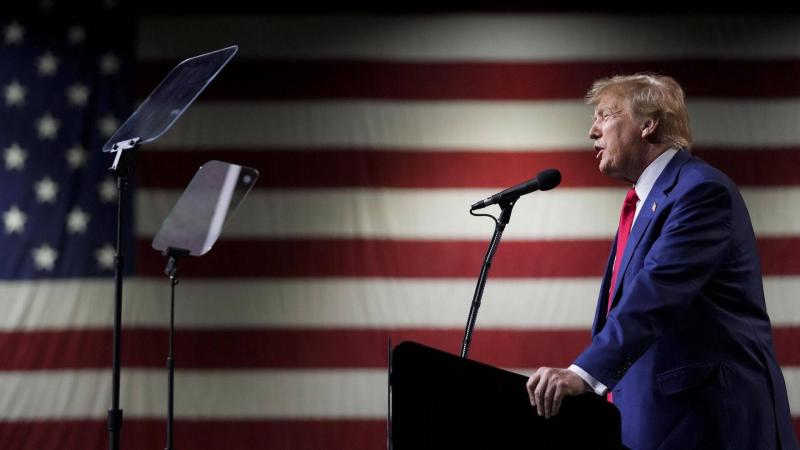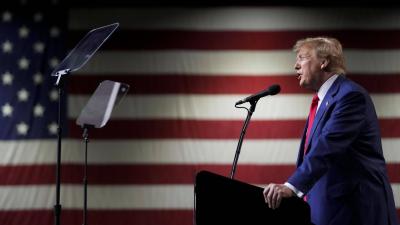The discussion in America about the chances of former President Donald Trump returning to the White House in January 2025 continues unabated. The man has a charisma that he knows how to use to expand his base of supporters and keep them on his side despite unprecedented legal battles aimed at obstructing his path to the presidency. Observers agree that he shines and grows more defiant under the extreme pressures he faces, renewing his resolve day by day to return to the White House. His followers call him "the savior," and Trump repeats that this might be the last chance to save America before everything is lost.
In fact, Trump jumped into the election campaigns early in 2022, even though his advisors advised him not to do so, but he aimed to use the trials targeting him as a "scapegoat," employing grievance cleverly, turning the criminal indictments into electoral material, considering them "politically motivated prosecutions" aiming to abort his right to restore America's greatness from its globalist captors.
In recent months, Trump has taken advantage of the absence of strong Republican competitors on one hand and a U.S. president facing countless internal and external crises on the other. He has begun to maneuver expertly in the American political landscape. While the path seems to be clearing for Trump to confidently move toward the White House, it may be wise not to expect any probabilities and surprises from Washington regarding what will unfold in the upcoming nine months.
Assuming Donald Trump maintains his upward trend in opinion polls over the coming months and overcomes obstacles to returning to the White House, what will be the general framework of his administration's policy in the Middle East?
**Palestine at the Heart of the Middle East**
By analyzing Trump's first administration's performance in the Middle East, it can be said that Arab countries might prefer a Trump-like America, dealing based on clear and mutually beneficial deals. As stated by Brian Hook, Trump's envoy to Iran, in a recent interview, "the best friend and the worst enemy," it must be acknowledged that the years of the Democratic administration have changed Washington's approach to the Middle East despite its delayed maturity after years of disappointing launches in the region. However, in recent months it has returned to emphasize the centrality of the Palestinian issue and placed the two-state solution among its priorities. Yet, many believe the proposition for America's re-engagement in the region has arrived late, facing resistance and rejection from the far-right government in Israel, which cannot accept the Palestinians' right to live in an independent state.
The Democratic administration may not be able to accomplish its vision for regional prosperity due to the short time remaining and its entry into the electoral fray, which extremists in Israel will exploit to crush the Palestinian people in Gaza and reoccupy the enclave, moving to the West Bank to annul the "Oslo Accords" and its legal ramifications. Here, we assume that the next Trump administration will continue its previous approach of ignoring the Palestinians' rights to their independent state in exchange for providing stability and economic incentives, as previously suggested in the initiative championed by his special advisor and son-in-law Jared Kushner within the framework of the Abraham Accords, achieving some success in establishing Israeli relations with a few Arab countries while sidelining the Palestinian issue, which opened the door for Israeli extremism to entice Arabs and disregard Palestinians.
This step will undoubtedly face a different response from Arabs, particularly from countries like Saudi Arabia, which holds a leadership position in the Arab world, especially following the historical offer it made to the Biden administration and the accords reached by regional countries with the current U.S. administration and the European Union regarding the two-state solution, which still awaits an Israeli partner to launch the regional prosperity initiative. Will President Trump be able to offer the best deals for the two-state solution, and more importantly, pressure Israel to implement it for the benefit of global, American, Arab, Palestinian, and Israeli interests?
Many observers suggest that Trump, in his upcoming approach to the Middle East during at least the initial phase, will need to deal with the legacy of the Biden administration, extinguishing numerous raging fires and addressing their regional and global impacts. He will not be able to retreat into American domestic issues to "make America great again," but will find himself compelled to work on ensuring the security of America's allies in the region and the world. Otherwise, the global standing of the U.S. will unravel in favor of the rising influence of China and possibly the greater ambitions of countries like Iran, which seeks to displace America through its Arab clients in the so-called "resistance axis."
**An American-Chinese Rivalry**
In reality, countries in the region are no longer preoccupied with signals from Washington. A glance at the nature of the transformations currently taking place in the Middle East shows shifts in the positions of its nations and changes in the international power balances concerning it, under circumstances quite different from those that prevailed during Trump's first term. It becomes essential for observers to follow the signals coming from Riyadh in the months following the U.S. elections in November 2024, as these will determine the possibilities of multipolarity in Middle Eastern policies. At that time, regional countries will not feel obligated to follow the path favored by Washington if it does not align with their national interests.
Finally, during a speech at the "Munich Security Conference," the Chinese Foreign Minister reiterated China's global vision, confirming its readiness to be a factor in achieving global strategic stability and enhancing cooperation among major powers. This message has been consistently reiterated by China to emphasize that it is a strong and stable nation with a predictable foreign policy, implicitly contrasting with the fluctuating policies of the U.S. across different administrations. This narrative has found a receptive audience in the region given the nature of its political structure, with its efficacy observed through the increased Chinese economic presence over the past decade in various Middle Eastern countries.
Given what was known about Trump’s first term regarding the escalation of tensions in U.S.-China relations, observers believe that President Biden’s recent efforts at the "San Francisco Summit" to rationalize relations with Beijing will witness a decline if Trump returns to the White House. This will ignite competition between the two largest countries in the world over the Middle East, casting shadows on political relations and placing regional countries in a position of having to choose between Washington and Beijing or maintaining a balance between them, with all the tensions that may ensue.
Current indicators and experiences from previous years suggest that the region is closer to welcoming Trump’s pragmatism than the ideological interpretations of the Democrats. Regardless of this or that scenario, ground realities indicate that regional leaders have become more experienced in regional diplomacy concerning prioritizing their agendas clearly, just like the historical Saudi proposal that will remain a significant marker and an indication of the emergence of a constructive regional global power. Thus, it shapes the nature of their relations with America based on the balance of international relations between East and West, possibly contributing to formulating more equitable and pragmatic relations with the Trump administration if it manages to navigate the final stretch and win the White House.
However the direction America will take in January 2025, the leaders of the Middle East will possess significant flexibility in dealing with the alternatives presented to maintain their national and collective interests. The era of anxious anticipation of Washington's decisions has passed, and they now face several alternatives that allow them not to lean towards one side, balancing their international relations among various global powers amicably and neutrally without the need to align.




